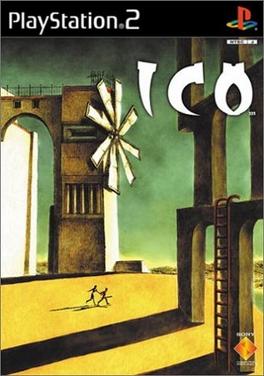Products You May Like
You know those beloved novels you always mean to read, but never quite get around to? Ico is my gaming equivalent. Released in 2001 for Sony’s bulky behemoth, this PS2 classic is heralded as one of the medium’s greatest achievements. If that wasn’t enough of an excuse for a games journalist to just fucking play it already, it’s also part of a trilogy that I utterly adore. Falling head over heels for creator Fumito Ueda’s feverishly anticipated 2016 epic The Last Guardian (remember thinking this would never release?) and most gamers’ first encounter with Ueda (seminal goliath slayer, Shadow Of The Colossus), Ico’s alluring box art has always beckoned. Now, with the PS2 classic available to stream via PS Plus Extra, it was finally time to see what the fuss is all about.
Entirely predictably then, Ico hooks me immediately. When it comes to the navel-gazing ‘games as art’ discourse, there’s a reason that Ico is always highlighted as a shining example. Light on narrative and heavy on ambience, Fumito Ueda’s breakthrough project is a majestic mood piece – a universally relatable adventure that largely avoids cutscenes and, instead, relies on its setting to tell its tale.
And what a setting. There’s a wonderfully surrealist quality to Ueda’s debut that immediately recalls the ill-fitting, ethereal nature of childhood dreams. Thanks to the PS3’s notoriously difficult-to-emulate cell processor, Ico is only available to stream via Sony’s rebranded PS Now service, giving it an unintentionally murky look. Still, it’s hard to care when the core art style is this good. At times, Ico’s odd camera angles and surrealist pacing make the whole thing feel like a playable Renaissance painting; amping up that dreamlike feel which defies Ico’s dated visuals, oozing a quietly entrancing sense of mystique and dread.
Much like Pixar’s finest, what minimalistic storytelling Ico does offer is subtle and universal – leaving the player to fill in the blanks. Beginning with a clomp of horses’ hooves, we join a nameless child hastily hauled into a castle by a troupe of armoured knights. Hurled into this ominous looking keep and chucked into a glowing stone casing, your fate is to be sealed away forever – “for the good of the village”. Classic case of countryfolk mentality, that. Thankfully, our inexplicably-horned hero is anything but hapless. Soon breaking free of his cement restraints, your avatar manages to topple the pod imprisoning him – leaving you free to roam the dingy castle and begin your escape.
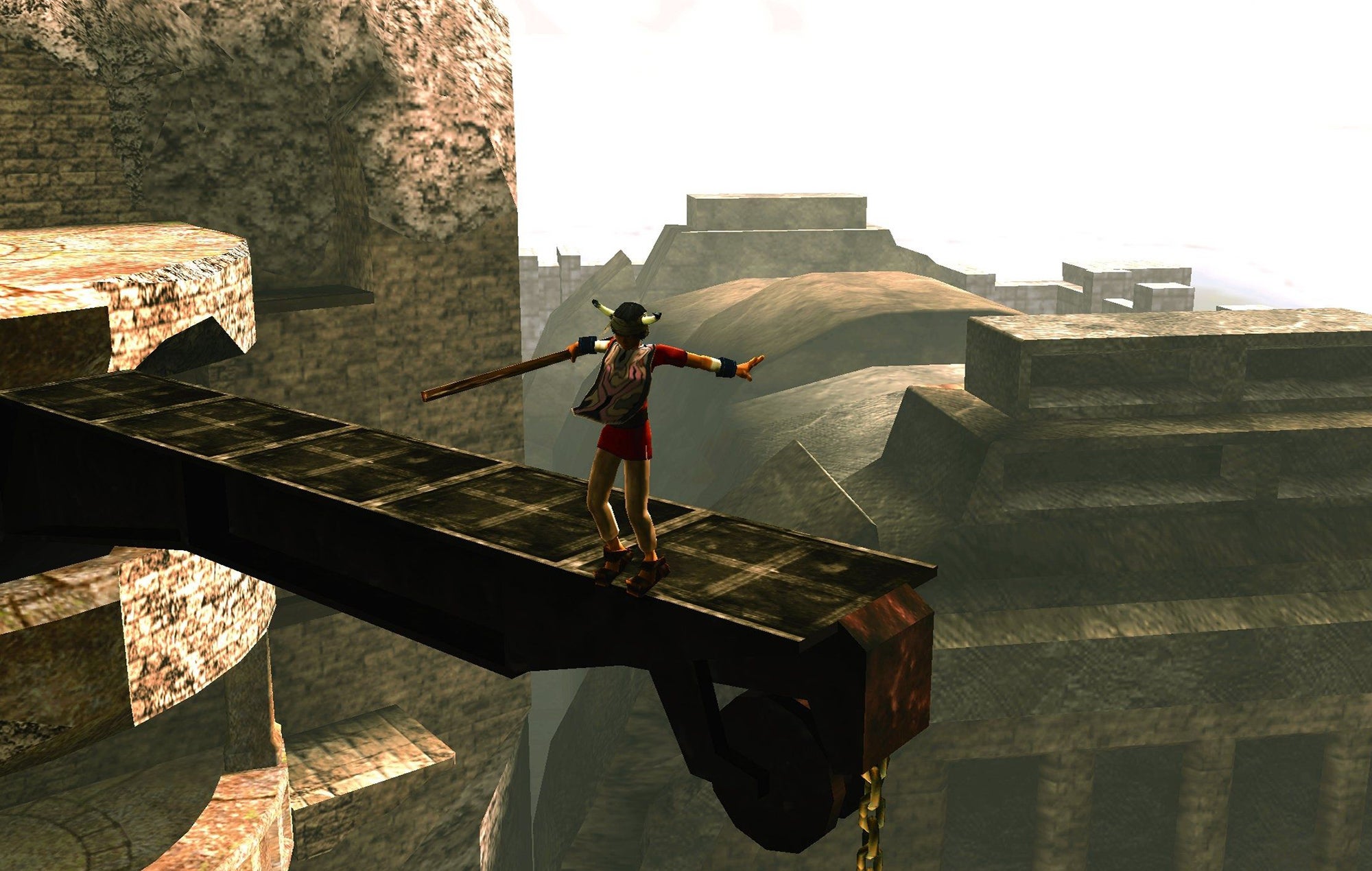
As sombre strings swell menacingly, every step in these ominous new surroundings feels like a slow-building panic attack. Much like in the best horror creations, it’s the absence of strings that really makes your hairs stand on end. For vast swathes of your journey, the only audio accompaniment is the echo of footsteps reverberating off stone, and the gentle flicker of flame illuminating darkened corridors.
Thankfully though, your castle capers soon become a little less lonely. Happening upon a glowing white girl hoisted in a swinging iron cage, our pointy headed hero immediately frees the only other prisoner in sight, and Ico truly begins.
To be honest, I’m still amazed at how well old Ueda boy nails the core concept: it takes balls to centre a game around a universally hated mechanic, but that’s exactly what Team Ico did. For anyone who knows their way around a controller, the dreaded escort mission is guaranteed to elicit a groan. From the eye-rolling sections spent babysitting the president’s daughter in Resident Evil 4 to the unholy union of underwater level and escort mission seen in Metal Gear Solid 2, these sections are filler at best, and a crime against gaming at worst.
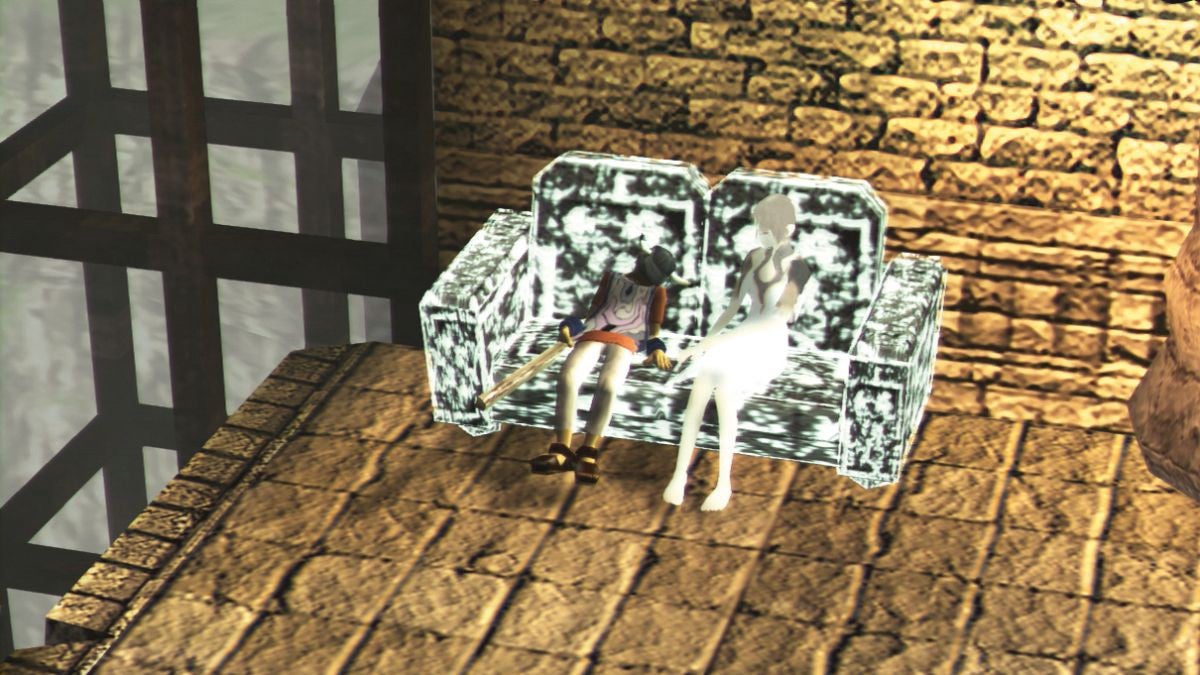
Somehow, these universally loathed sections in Ico feel – whisper it – charming. It turns out, escort missions in most games frustrate because they’re a jarring transition from power fantasy to vulnerability. In Ueda’s classic, there’s no such power to be lost. With both you and your ethereal companion clearly just scared kids, your journey together feels like one of equals – never a burden. It’s this bond developed via gameplay that makes the experience so utterly charming. Ico excels at making you feel like a child, and as you squeeze ‘R1’ to gently grab this mysterious glowing girl’s (Yorda) hand, it’s a gesture that feels genuinely sweet. Ico is littered with heart-warming touches like this – moments that perfectly capture that childlike feeling of innocence, that yearning for adventure and the ease of forming pre-adolescent friendships.
The AI is remarkably, considering the game’s age, too. Subtle design choices make technological limitations feel utterly intentional. With Yorda speaking an ancient language you can’t quite parse, there’s always something lost in translation. It’s a masterstroke in game design, meaning that when the ageing AI doesn’t quite understand your command it just feels like your standard goof between a horned boy and glowing celestial being. Hey, we’ve all been there.
For those who have played The Last Guardian, this may all sound pretty familiar. This clever plot device ensures – just like in that certain other Ueda-helmed game – that when things come together and Yorda does perform the action you hoped, it’s incredibly satisfying.
Much like the Trico-starring spiritual successor, thanks to the AI-led setup, this is another creation that leans into the terror of separation anxiety – and, boy, does Ico give you things to be anxious about.
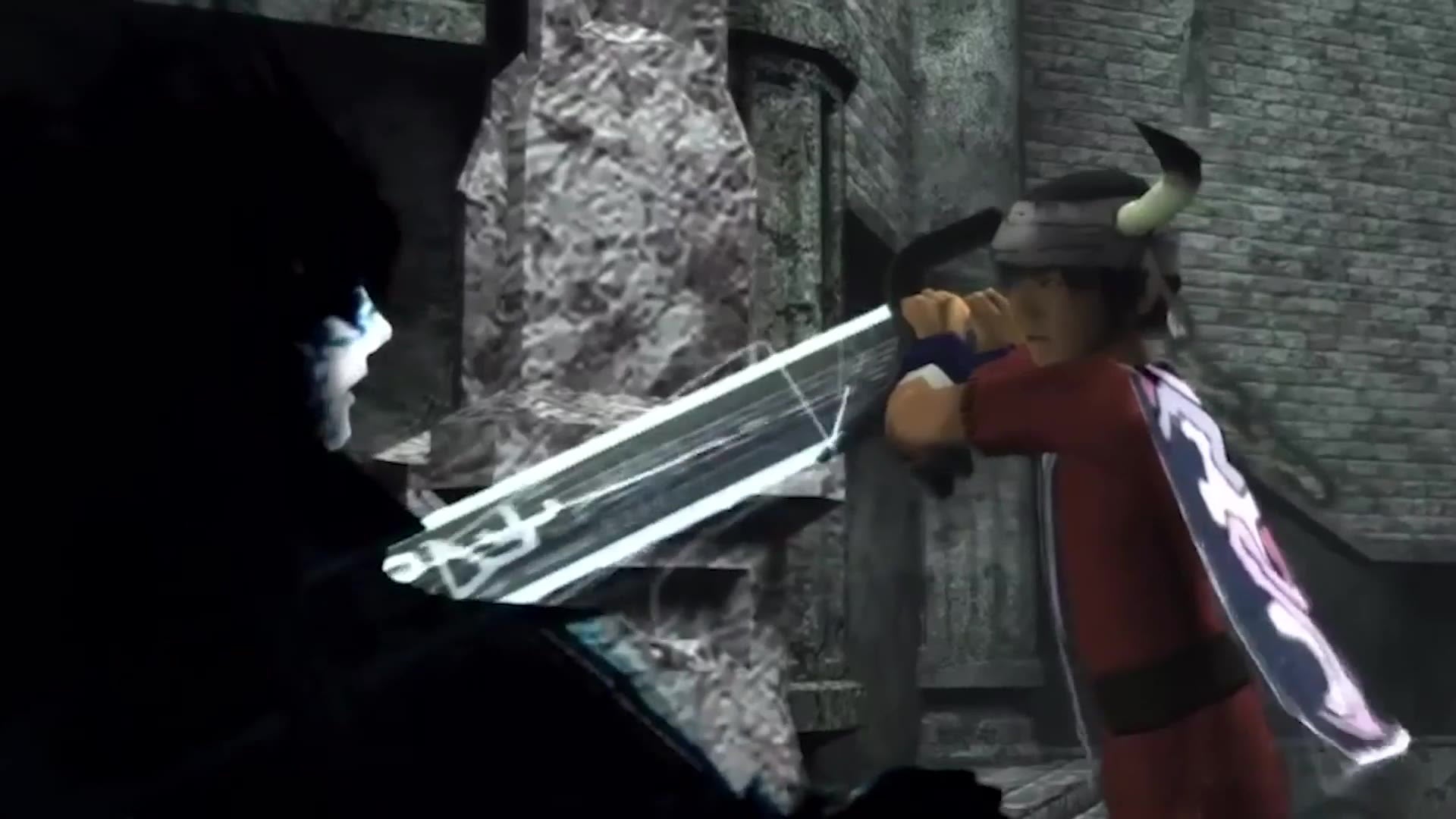
Leave your new-found friend alone too long and Yorda’ll find herself pursued by shadowy fiends, tangled in tar-like tendrils and dragged into darkness. Thankfully, you can beat away these apparitions with a stick, sword or whatever you have to hand, sending them packing and leaving you free to carry on your escape.
While initially frustrating, this ever-present danger quickly ensures that you and Yorda become inseparable. Knowing that Yorda could be in danger at any point dramatically raises the tension as you’re regularly forced to leave her behind. With each ledge you climb and new room you enter, you grow further and further away from your defenceless companion, ensuring each departure is a masterclass in digital dread.
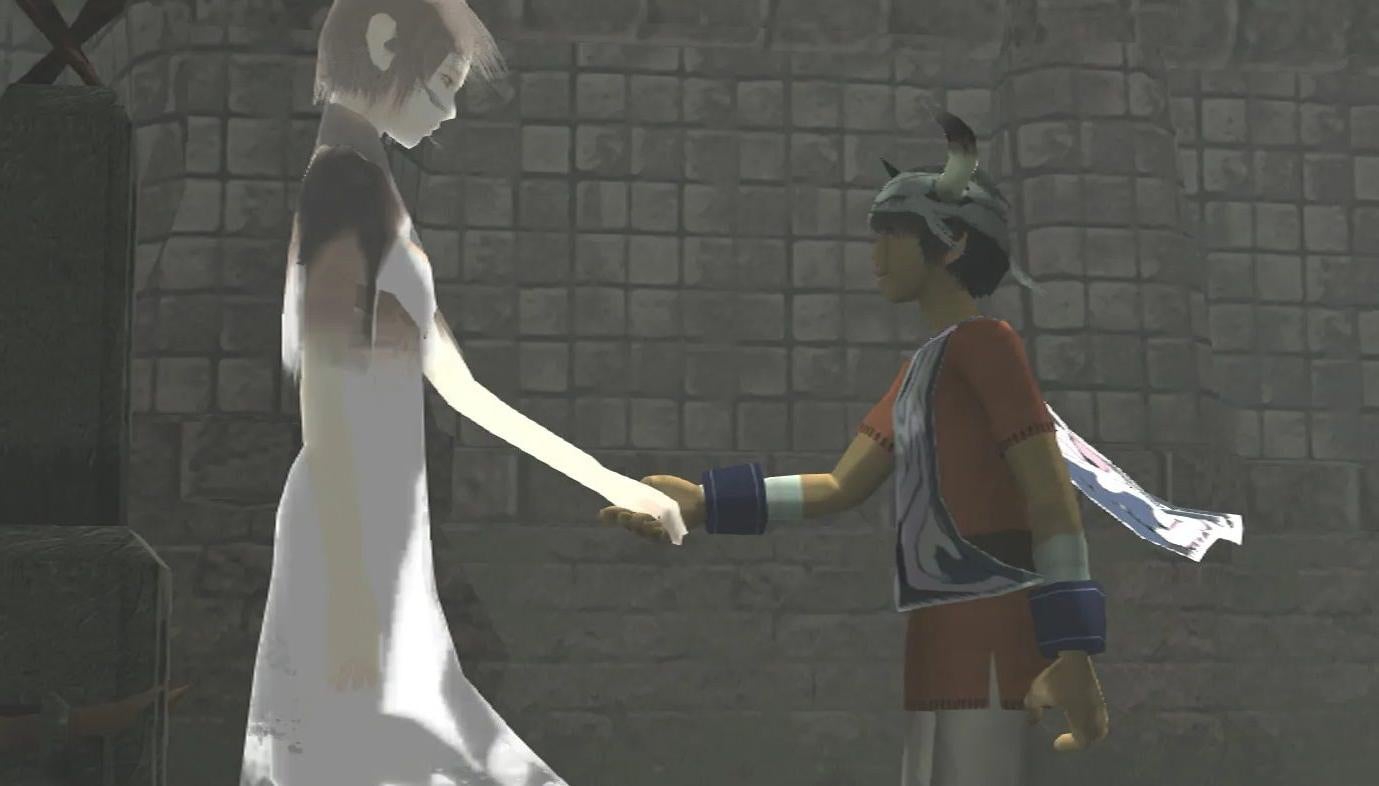
Ultimately, Ico is somewhere between an adventure experience and a puzzle game. When it comes to solving conundrums in games there’s a thin line between design genius and hurling a controller. Mercifully, Ico’s head-scratchers are wholeheartedly the former. Thanks to crystal clear visual signposting and elegantly crafted environments, Ico gently nudges you towards its objects of interest, making you feel like the genius mummy and daddy always said you were. Even as the scale of puzzles escalates, it’s testament to the brilliance of the design that unlike so many modern games, Ico’s puzzles never feel unsolvable.
Still, however you choose to view it, even 21 years after its release, Ico is still undoubtedly a masterpiece. Where games are so regularly tied to the tech behind them, this os a creation that stands the unforgiving test of time largely because of how oddly surreal it is. Like many games of yesteryear, it also knows not to overstay its welcome.
In a medium filled with bloated 100 hour epics, this perfectly paced six hour adventure is a breath of fresh air. Where open world opuses see players tire long before the credits have rolled, Ico’s breakneck pace and satisfying conclusion left me wanting more. Sure, it’s a crying shame that Ico skipped the PS4 Pro upgrade developer Bluepoint pulled out for Shadow Of The Colossus, but it speaks volumes that even when played via a slightly blurry stream, Ico feels nothing short of essential.
